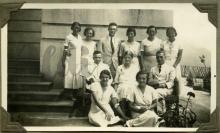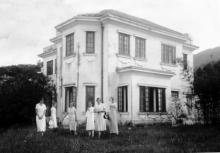Mildred Dibden was a missionary with the evangelical Anglican Bible Churchmen's Missionary Society. She first came to Hong Kong in 1931, but had to go home because of a near-fatal bout of malaria. She had noticed the plight of Hong Kong's abandoned children, and was determined to help them, so she returned to the Colony in 1936 and opened orphanges in various locations including Cheung Chao. In 1940 she moved into an estate in Fanling and kept this home open, with the assitance of Ruth Little and Chinese staff, throughout the Japanese occupation.
She continued her work after the war, founding Shatin Babies Home in 1952. In 1966 she went back to England taking just over 20 Chinese girls with her.
Sources and more information:
https://jonmarkgreville2.wordpress.com/2013/07/29/mildred-dibden/


Comments
Daily Mail Feature
Daily Mail July 17th 1961
The Faith of Miss Mildred saves 300 children
Miss Mildred Dibden, ‘mother’ to 300 Chinese children, walked in a Kent garden last night and quietly quoted part of a verse from Isaiah: “…bring the poor that are cast out into your house.”
Her remarkable life has been based entirely on that Biblical verse. She has risked jail for it, starved for it, nearly died for it, and been clubbed across the face with a Japanese rifle because of it.
She stayed
At 56 she is one of Britain’s unknown heroines. She is home from China only because an anonymous donor gave her the air fare and because she wanted to see her 88-year-old mother for only the third time in 30 years.
Back in Shatin, a village eight miles from Hong Kong, stands the monument to her faith – a home for unwanted Chinese babies which she started with only £5.
During the war she could have escaped the Japanese as they poured into Hong Kong. Instead she stayed to protect the 98 foundlings who bore her surname and called her ‘Mama.’
She said at her sister’s home in Court Road, Tunbridge Wells, last night: ‘Japanese soldiers were billeted on me, and one night as they tried to rape my nurses, I was clubbed with a rifle.
‘They knocked over two cots and the babies in them died from their injuries. During the next few weeks I had to watch helplessly while 50 of my new-born babies starved to death. There was no milk.’
But Mildred Dibden survived the war, although malaria, dysentery, and beri-beri reduced her to a near-skeleton. After leave in Britain she returned to China as soon as she could.
‘I had no money. I’ve never had money,’ she said. ‘Just a trust in the goodness of God and the kindness of men.’
Horrified
It was her faith that sent Miss Dibden to China, 30 years ago, when she volunteered as a missionary. During three years in China she was horrified by the thousands of babies abandoned because of poverty or disease. She asked for official backing to start a home for the babies. No one would help her, so she started up on her own.
She explained: ‘Ever since I was first refused official help, I have never had nor wanted any backing, either from a fund, a society or a church. Somehow, God has always provided the money.’
Miss Dibden added: ‘The British Government in recent years has offered me a grant, but I think God wants me to go on working alone.’
For information on Mildred Dibden and her homes please contact through Gwulo.com
Mildred Dibden
@dibden:
Many thanks for this and all the other very interesting content you've been providing.
Thank You
Thank you Brian. But you surely are the past master!
China's Oasis Item
This article by Richard Harris gives his take on Mildred Dibden's story in the light of other missionary names. He also mentions Valerie Conibear and Wendy Blackmur, whose work sprang out of their work with her.
1966 Moving to the UK
This 1966 video from British Pathe shows Ms Dibden, the children's home at Shatin, and several of the girls who lived there, shortly before they relocated to the UK:
https://www.britishpathe.com/asset/211200/
Mildred Dibden in the Australian Newspapers
1. Article in the Australian Women's Weekly dated 14 January 1970 - The Yip's Family Aunty Ruth.
2. Article in the Newcastle Sun dated 31 August 1943 providing the first direct communication (written in January 1943) received from Miss Ruth Little. The well-being of Miss Dibden and the continuing work of the Fanling Babies' Home are mentioned.
3. Article in the Daily News (Perth, W.A.) dated 12 September 1945 on the ordeal suffered by three women medical missionaries, Little, Dibden and Critchell during the Japanese Occupation.
4. Article and photo in the Sydney Morning Herald dated 1 October 1966 on devoting her life to charity and leaving Hong Kong for England with 21 of her "babies".
Christian missionaries in Hong Kong
Aldi, I'm sure you must be familiar with the publications of Patricia Chiu, who is a real authority on Christian missionaries in Hong Kong and the Christian education of girls in Hong Kong. Perhaps you are already in touch with her.
https://hkupress.hku.hk/index.php?route=product/product&author_id=199&p…
If anyone knows where a photo of the BCMS foundling home at 24 Broadwood Road might be found it would be Patricia Chiu.
Thank you Jill
I'm actually not aware of her, Jill, but it sounds a useful lead. Thank you.
Arrival of Miss Dibden
The Hong Kong Daily Press dated 20 November 1931 notes that a "Miss Dibden" arrived on the S. S. Corfu the preceding day (the 19th). On board was also Miss L. M. Baird.
Mildred Dibden left Hong Kong and returned on 8 November 1936 on the S.S. Suwa Maru. Hong Kong Daily Press 10 November 1936 refers.